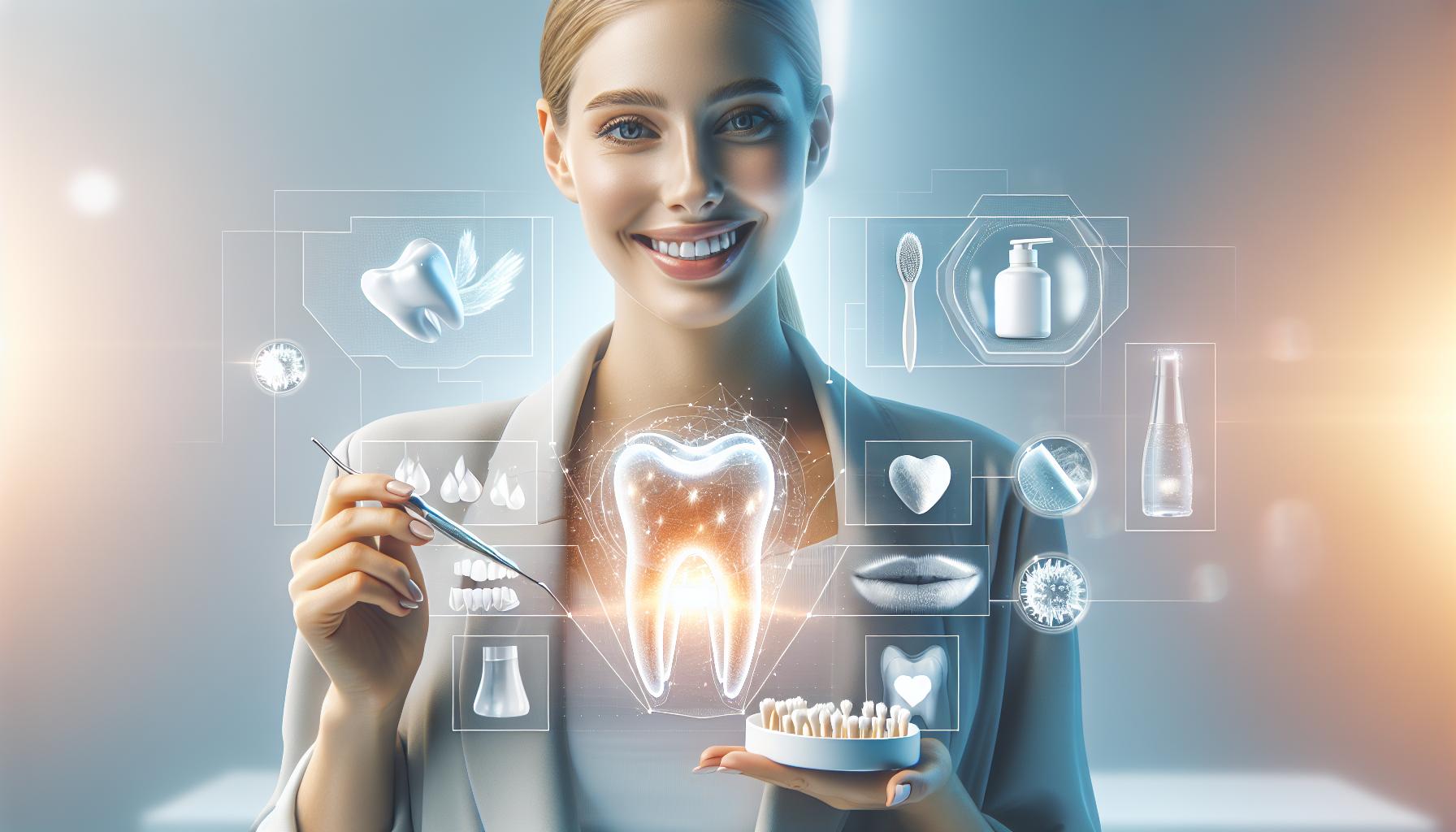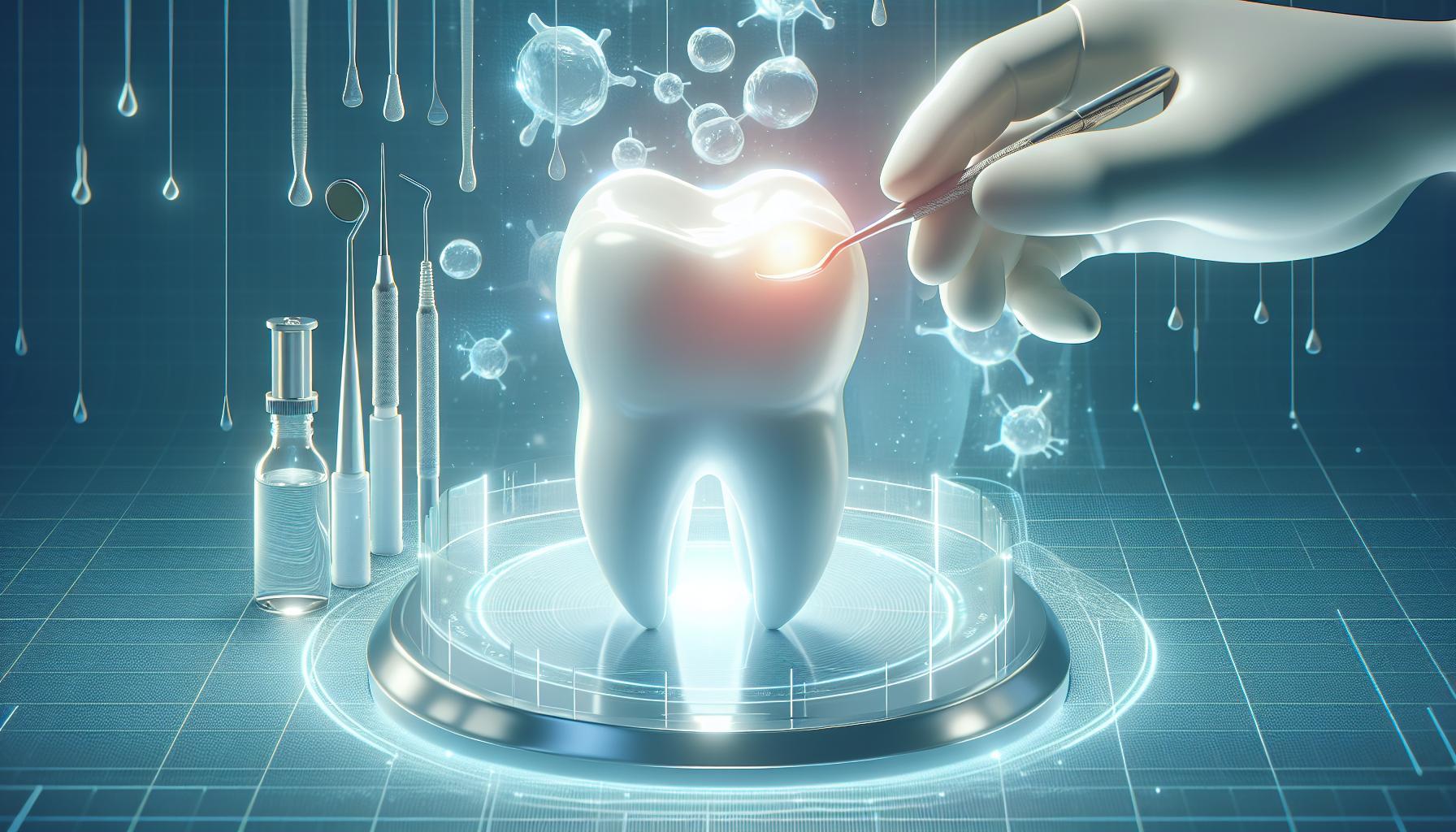Your daily oral care routine might not be enough to combat the stubborn buildup of plaque and tartar, which can lead to more serious dental issues. Understanding how to effectively manage this buildup at home is crucial for maintaining healthy teeth and gums. Discover effective strategies to keep your smile radiant and free from harmful deposits without the need for professional tools.
Understanding Plaque and Tartar: What You Need to Know
Understanding the Formation of Plaque and Tartar
Did you know that within just 24 hours, bacteria in your mouth can form a sticky layer known as plaque? This soft, colorless film is the initial stage of dental issues, setting the stage for more serious problems if not managed properly. Plaque develops from the food we consume, leading to the accumulation of oral bacteria, which, if left untreated, hardens into tartar—also known as calculus. Tartar is not just unsightly; it can contribute substantially to gum disease and cavities by providing a habitat for harmful bacteria.
- plaque is primarily made of bacteria, food particles, and saliva. It forms quickly and can frequently enough be removed with regular brushing and flossing.
- Tartar, on the othre hand, forms when plaque is allowed to harden on the teeth, typically through the mineralization processes facilitated by saliva. It can only be removed through professional cleaning by a dentist or dental hygienist.
Consequences of Ignoring Oral Hygiene
Ignoring plaque buildup is a common mistake that can have serious consequences for your oral health. As plaque matures and hardens into tartar, it can change the landscape of your dental health dramatically. Tartar can lead to increased plaque retention, creating a vicious cycle that aggravates gum disease. Research indicates that this buildup can lead to gingivitis and, if not addressed, further progress to periodontitis, a more severe form of gum disease.In fact, tartar not only gives teeth a yellowish tint but also fosters an environment where bacteria thrive, increasing the risk of cavities and bad breath. Regular dental visits combined with effective daily oral care can stave off these issues and keep your mouth healthy.
Proactive Steps for prevention
To effectively combat plaque and tartar buildup, consider integrating the following practices into your daily routine:
- Daily Brushing: Brush your teeth twice a day with fluoride toothpaste. This helps in effectively removing plaque.
- Regular Flossing: Floss daily to remove plaque and food particles from between the teeth and beneath the gumline.
- Use of Antimicrobial Mouthwash: Rinse with an antibacterial mouthwash to further reduce bacteria and prevent plaque formation.
- Dietary Choices: Limit sugary and starchy foods that fuel bacterial growth.Opt for a balanced diet rich in vegetables, fruits, and whole grains.
By understanding the differences between plaque and tartar, and implementing these actionable steps, you can keep your smile healthy while learning effective ways on how to remove plaque and tartar from your teeth without specialized tools. Regular preventive care is key to maintaining your oral health over the long term.
Daily Habits that Help Prevent Plaque Buildup

Essential Daily Habits to Combat Plaque Buildup
Did you know that plaque can begin forming on your teeth just hours after brushing? This sticky film of bacteria thrives on food particles,especially sugars and starches. To effectively remove plaque and prevent tartar buildup, adopting a diligent oral care routine is vital. Here are key daily habits to integrate into your life.
- Brush Twice a Day: Choose a fluoride toothpaste and brush your teeth for at least two minutes each time. This routine not only helps eliminate plaque but also strengthens enamel.
- floss Daily: Cleaning between your teeth is crucial as brushing alone can’t reach these tight spaces. Flossing removes food particles and plaque from areas your toothbrush cannot reach.
- Use Mouthwash: An antimicrobial mouthwash can help reduce plaque and gingivitis. Rinsing after brushing and flossing enhances oral hygiene significantly.
- Maintain a Healthy Diet: Limit sugary and starchy foods, as they contribute to plaque formation. Instead, opt for fruits, vegetables, and whole grains that can help scrub your teeth as you chew.
- Regular Dental Visits: Schedule check-ups with your dentist every six months for professional cleanings and examinations. Early detection of plaque buildup can save you from more serious dental issues.
Recognizing the impact of these habits is the first step toward healthier teeth. Such as, a recent study showed that participants who followed a stringent brushing, flossing, and rinsing regimen reduced thier plaque levels by 40% over three months. By adhering to these actionable steps—notably highlighted in discussions about how to remove plaque and tartar from your teeth without tools—you can achieve and maintain optimal oral health.
Natural Remedies for Effective Plaque Removal

The battle against plaque buildup doesn’t always require a trip to the dentist; nature has equipped us with several effective remedies that can help you maintain a healthy smile from the comfort of your home. Understanding how to leverage these natural solutions is key to keeping your teeth clean and reducing the chances of tartar formation.
Utilizing Citrus for Plaque Control
One surprising ally in your oral health arsenal is the humble orange. The limonene found in orange peels has been shown to break down plaque effectively.In addition to this, the vitamin C in oranges can help combat the harmful microorganisms that contribute to plaque. To use, simply rub the inside of the orange peel on your teeth for a few minutes before brushing your teeth normally. Regularly incorporating this practice can enhance your plaque-fighting efforts naturally[[1]](https://dublincornersdental.com/blog/home-remedies-plaque/).
saltwater Rinses for Freshness and Cleanliness
Rinsing your mouth with warm saltwater is another simple yet powerful method for plaque reduction. The salt acts as a natural disinfectant, helping to reduce the overall number of bacteria that can contribute to plaque and gingivitis. Mixing about a teaspoon of salt in a cup of warm water and swishing it around your mouth for about 30 seconds can provide a soothing effect, especially if your gums are inflamed[[2]](https://www.healthline.com/health/dental-and-oral-health/gingivitis-home-remedy).
baking Soda: The Natural Abrasive
Baking soda is a common household ingredient that can play an essential role in oral hygiene.Its mild abrasive properties make it effective for scrubbing away plaque and tartar deposits.To use, simply mix a tablespoon of baking soda with a few drops of water to form a paste. Apply this paste to your toothbrush and brush your teeth gently. This method can be used a few times a week as part of your routine, ensuring a brighter smile and healthier gums[[3]](https://www.sutherlanddental.com.au/blog/natural-remedies-to-remove-tartar-at-home/).
Creating a extensive Natural Routine
Combining these natural remedies into a consistent oral care routine can significantly improve your dental health. Here is a simple schedule to follow:
| Day | Activity |
|---|---|
| Daily | Orange peel rub + Baking soda brushing 2-3 times a week |
| Alternate days | Saltwater rinse |
By harnessing the power of these natural ingredients and integrating them into your daily oral hygiene practices, you can effectively manage plaque and tartar buildup without specialized tools, leading to a brighter, healthier smile.
DIY Techniques to Combat Tartar Accumulation

Did you know that maintaining your dental hygiene at home can significantly reduce tartar buildup, sparing you from expensive dental visits? There are various effective DIY techniques to help combat tartar accumulation without requiring professional tools.Here we will explore several approaches involving commonly available household items, aiming to keep your teeth healthy and clean.
Powerful Household Solutions
To start, consider using a combination of baking soda and tea tree essential oil. Baking soda acts as a gentle abrasive that can effectively help scrub away plaque. Tea tree oil is known for its antibacterial properties, making this mixture a potent natural mouthwash. Simply combine a teaspoon of baking soda with a few drops of tea tree oil in a cup of warm water. Rinse your mouth with this solution for a few minutes,and then follow up with regular brushing for enhanced effectiveness [[1]](https://accessdentalclinics.com/blog/teeth-whitening/how-to-remove-tartar-from-teeth-without-dentist/).
Another effective method involves a simple vinegar and salt rinse.Mix two teaspoons of white vinegar with half a teaspoon of salt in a small glass of water. The vinegar’s acidity helps dissolve tartar, while salt acts as a natural disinfectant. Use this solution as a mouth rinse up to two times a week to see improvements [[2]](https://dorseyfamilydentalmd.com/how-to-remove-tartar-and-plaque-from-your-teeth-without-a-dentist/).
brushing Techniques
Incorporating the right brushing techniques can also have a significant impact on plaque and tartar removal. Using a toothbrush with soft bristles, brush your teeth gently but thoroughly. Aim for a duration of at least two minutes,ensuring that you cover all surface areas of your teeth. Consider using a baking soda toothpaste, as it can definitely help to safely remove plaque without harming your enamel [[3]](https://www.medicalnewstoday.com/articles/324341).For best results, maintain a consistent dental hygiene routine that includes brushing at least twice a day, flossing regularly, and using the aforementioned rinses as needed. With dedication and these DIY techniques, you can effectively manage tartar accumulation and contribute to your overall oral health.
The role of Diet in Maintaining Dental Health
Diet plays a pivotal role in oral health, influencing not just the appearance of your smile but also the overall condition of your teeth and gums. Did you know that what you eat affects the formation of plaque and tartar? Incorporating a balanced diet filled with essential nutrients can fortify your dental health and diminish the need for aggressive cleaning techniques. To maintain optimal dental hygiene,it’s crucial to focus on foods that can naturally combat plaque build-up while supporting your teeth’s structural integrity.
The Impact of Nutrition on Dental Health
A diet rich in vitamins and minerals directly contributes to stronger teeth. Calcium-rich foods, like dairy products, offer essential nutrients that strengthen tooth enamel and bones. Similarly, fiber-rich fruits and vegetables, such as apples, carrots, and celery, not only clean your teeth as you chew but also stimulate saliva production, which helps neutralize acids that cause decay [1[1]. Additionally, the presence of vitamins A, C, and K in various fruits and vegetables boosts gum health, reducing the risk of gum disease.
- Calcium Sources: Milk, cheese, yogurt
- Vitamin-Rich options: Spinach, kale, strawberries, oranges
- Saliva Stimulators: Apples, carrots, cucumbers
Foods to Avoid
Equally significant is recognizing the impact of certain foods that exacerbate plaque and tartar formation. Sugary snacks and beverages create an environment conducive to bacteria that thrive on sugars, leading to acid production and enamel erosion. Refined carbohydrates, found in products like white bread and candy, can also contribute to plaque build-up. As tempting as they may be, frequent snacking on these items can lead to increased plaque accumulation and dental problems [2[2].
Practical Advice for a Dental Health-Conscious diet
To bolster your dental health effectively, consider these actionable steps:
- Drink Water: Hydration is key.Water not only flushes out food particles but also supports saliva production—the body’s natural defense against cavities.
- Timing Matters: Instead of grazing on snacks throughout the day, plan meals to maximize saliva production. Eating balanced meals can reduce the frequency of acid attacks on your teeth [1[1].
- Incorporate Probiotics: Foods like yogurt or fermented products can help improve gut health and potentially influence oral bacteria positively.
By adopting a proactive approach incorporating these dietary elements, you’ll be well on your way to improving your dental hygiene. This is a significant step in learning how to remove plaque and tartar from your teeth without resorting to harsh tools or treatments.
Gentle Teeth Cleaning with Household Items
One of the most surprising truths about dental health is that you don’t need a full arsenal of tools or visit the dentist for a professional cleaning to effectively manage plaque and tartar buildup. In fact, many household items can serve as your allies in maintaining a brighter smile. Understanding how to leverage these everyday products can transform your daily oral hygiene routine into a more effective practice.
Effective Household Items for Gentle Teeth Cleaning
Many common items found in your kitchen or bathroom can double as cleaning agents for your teeth. Here’s a look at some of the most effective ones:
- Baking Soda: This gentle abrasive is fantastic for removing surface stains and neutralizing acids in your mouth. Mix a small amount with water to create a paste and brush your teeth with it a few times a month.
- Hydrogen Peroxide: Known for its antibacterial properties,a diluted solution (mixing equal parts hydrogen peroxide and water) can be used as a mouth rinse to help eliminate bacteria and freshen breath.
- Coconut Oil: Utilizing oil pulling can reduce plaque and help with oral hygiene. Swish a tablespoon of coconut oil in your mouth for about 10-15 minutes before spitting it out.
- Apple Cider Vinegar: While potent, it’s important to use this sparingly. A mixture of apple cider vinegar and water can definitely help whiten teeth and combat bacteria when used as a mouth rinse.
Simple Tips for Implementation
Incorporating these methods into your daily routine is straightforward. However, to prevent damage to your enamel, moderation is key. As an example, if using acid-based items like vinegar or baking soda, limit these techniques to once a week. Additionally, following up with a fluoride toothpaste or mouthwash can help strengthen your enamel, countering any potential erosion from the acids.
| household Item | Benefits | How to Use |
|---|---|---|
| Baking Soda | Removes stains, neutralizes mouth acidity | Mix with water for a paste; brush teeth occasionally |
| Hydrogen Peroxide | disinfects, freshens breath | Mouth rinse with diluted solution |
| coconut Oil | Reduces plaque, antibacterial | Swish for 10-15 minutes |
| Apple Cider Vinegar | Whitening, combats bacteria | Mouth rinse with diluted solution |
By utilizing these gentle cleaning methods, you can significantly enhance your dental care routine without reaching for professional tools. Keeping your teeth clean and healthy doesn’t always require a trip to the dentist, especially when you know how to effectively harness the power of what you already have at home. This approach reflects one of the core principles in “How to Remove Plaque & Tartar from your Teeth: No Tools Needed,” demonstrating that with a little creativity, effective oral hygiene is within everyone’s reach.
When to seek Professional help for Tartar Removal
Understanding the Need for Professional Tartar Removal
Did you know that ignoring tartar buildup can lead to more serious dental issues? Tartar, or calculus, forms when plaque—a sticky film of bacteria—hardens on your teeth. While regular brushing and flossing are essential for dental hygiene, they may not always suffice in removing stubborn tartar. here are some signs indicating it’s time to seek professional help for tartar removal.
- Visible Tartar Accumulation: If you notice yellow or brown deposits on your teeth, especially near the gum line, it’s a signal that tartar has formed. Regular dental cleanings are designed to effectively address such build-ups, which brushing alone cannot manage [[2](https://my.clevelandclinic.org/health/treatments/11187-dental-check-up)].
- Data on Oral Health: Studies have shown that individuals with significant tartar accumulation are at a higher risk for gum disease and cavities. Therefore, a professional cleaning not only restores the aesthetic of your teeth but significantly enhances your overall oral health[[1](https://www.medicalnewstoday.com/articles/324341)].
- Increased Sensitivity or Discomfort: Experiencing sensitivity to hot or cold foods can indicate that tartar is affecting your gum health. If your gums are receding or there’s pain when brushing, consult a dental professional [[3](https://www.aspendental.com/dental-services/dental-cleaning/)].
When Not to Wait
It’s essential to address tartar buildup before it exacerbates oral health problems. Regular dental visits, typically recommended twice a year, help in early identification and management of such issues. If you’ve missed these appointments or your last cleaning was more than six months ago, scheduling an appointment should be your priority. A professional cleaner can not only remove existing tartar but also prevent future deposits from forming through effective scraping techniques and thorough cleaning methods.
Utilizing a professional dental service is crucial not just for removing tartar but for ensuring the longevity of your dental health. By keeping a vigilant eye on your oral hygiene and recognizing when external help is needed, you can maintain a bright and healthy smile while also learning practical tips from resources like “How to Remove Plaque & Tartar from Your Teeth: No Tools Needed” for at-home maintenance.
Maintaining a Bright smile: Tips for Long-Term Oral Health
Maintaining excellent oral health is key to achieving a bright smile and preventing the build-up of plaque and tartar, which can lead to decay and gum disease.Consistent routines and lifestyle choices significantly influence the longevity of your dental health. By integrating effective oral hygiene practices into your daily life, you can keep your teeth sparkling and reduce the need for professional cleaning.
Daily Hygiene Practices
To begin your journey towards a healthier mouth, establish a strong daily oral care routine. The foundation of this routine is thorough brushing and flossing. Aim to brush your teeth at least twice a day using fluoride toothpaste. Not only does fluoride help to remineralize tooth enamel, but it also combats the bacteria responsible for plaque formation. When brushing, use a soft-bristled toothbrush and focus on the following:
- Brush for at least two minutes, ensuring you cover all surfaces of each tooth.
- Use gentle circular motions to avoid damaging your gums.
- Replace your toothbrush every three to four months or sooner if bristles fray.
Flossing is equally essential for accessing the tight spaces between your teeth where a toothbrush can’t reach.make it a habit to floss at least once daily to remove trapped food particles and plaque. Over time,this practice can significantly reduce your risk of tartar build-up and maintain gum health.
Regular Dental Visits
In addition to your daily efforts, visiting your dentist regularly for check-ups and cleanings is crucial. Most experts recommend scheduling a dental appointment every six months. During these visits, your dentist can effectively remove any tartar that has accumulated and detect potential issues before they escalate. Regular cleanings complement your home care routine by providing a deeper clean and reinforcing the importance of good oral hygiene habits.
dietary Choices for Oral Health
Your diet plays a vital role in maintaining a bright smile. Foods rich in calcium and phosphorus, such as dairy products and leafy greens, support tooth and bone health. Additionally, consider limiting sugary snacks and beverages, as these can lead to plaque formation. instead, incorporate crunchy fruits and vegetables, like apples and carrots, which can help scrub your teeth naturally. Staying hydrated by drinking plenty of water is also beneficial, as it helps rinse away food particles and bacteria.
| Food Type | Benefits for Oral Health |
|---|---|
| Dairy Products | rich in calcium; helps strengthen enamel |
| Citrus Fruits | High in Vitamin C; supports gum health |
| Crunchy Vegetables | Helps scrub teeth; promotes saliva production |
| Water | Rinses mouth; prevents dry mouth |
By following these tips and incorporating them into your daily routine, you can significantly reduce plaque and tartar accumulation, keeping your smile bright and healthy. Maintaining these practices over the long term will foster not only a beautiful smile but also overall oral health, allowing you to enjoy the benefits of strong teeth and healthy gums.
Frequently asked questions
How to Remove Plaque & Tartar from Your Teeth: No Tools Needed?
To remove plaque and tartar from your teeth without tools, start by practicing good oral hygiene, such as brushing twice daily and flossing regularly. You can also use natural remedies like baking soda and apple cider vinegar to gently scrub your teeth.
These methods help break down and remove buildup effectively. Incorporating certain foods, such as crunchy fruits and vegetables, can also aid in not only cleaning your teeth but also stimulating saliva production, which naturally cleanses the mouth. For comprehensive dental care,consider maintaining regular professional cleanings.
What is the difference between plaque and tartar?
Plaque is a soft, sticky film of bacteria that forms on teeth, while tartar is hardened plaque that develops when plaque is not removed.Tartar can only be removed by a dental professional.
If left untreated, both can lead to cavities and gum disease. Maintaining a regular brushing and flossing routine can definitely help prevent plaque from hardening into tartar, thus promoting better oral health.
Why does plaque turn into tartar?
Plague turns into tartar due to the presence of minerals in saliva, which harden the plaque when it remains on teeth for an extended period. Regular brushing is essential to prevent this process.
When plaque is not effectively removed, it mineralizes within about 24 to 72 hours. This is why it’s crucial to practice good oral hygiene consistently to keep your teeth and gums healthy.
Can I remove tartar at home?
While you can manage plaque buildup at home, removing tartar effectively typically requires professional cleaning. Home remedies may help reduce plaque,but they won’t remove tartar.
If you notice significant tartar buildup, it’s best to visit a dentist. They can safely and effectively remove tartar to prevent further dental health issues.
What natural remedies can definitely help remove plaque?
natural remedies to help remove plaque include baking soda,which acts as a mild abrasive,and apple cider vinegar,known for its acidity that can help dissolve plaque.
To use these effectively, you can mix a small amount of baking soda with water to form a paste, or dilute apple cider vinegar with water and use it as a mouth rinse. Though, moderation is key as acidity can wear down enamel over time.
How frequently enough should I brush my teeth to prevent plaque buildup?
You should brush your teeth at least twice a day for at least two minutes each time to effectively prevent plaque buildup. This routine helps remove food particles and bacteria that contribute to plaque formation.
Additionally, don’t forget to floss daily, as this helps clean areas between teeth that brushing alone might miss. Consistency is vital for maintaining optimal dental health.
Is it possible to whiten teeth while removing plaque?
Yes, some methods for removing plaque can also help whiten teeth. Using baking soda, as an example, can both clean your teeth and reduce staining.
However, for more effective whitening, consider using specific whitening products in conjunction with your oral hygiene routine. Always consult with a dentist before starting any whitening treatment to ensure safety and effectiveness.
In Conclusion
Maintaining optimal oral health is within your grasp! By implementing simple, effective habits such as brushing with fluoride toothpaste, flossing regularly, and rinsing with an antibacterial mouthwash, you can significantly reduce plaque and tartar buildup at home. Remember, while these techniques empower you to take charge of your dental hygiene, professional cleanings are essential for reaching those hard-to-clean areas and preventing issues like gum disease. Make it a point to visit your dentist regularly for a thorough checkup and cleaning—your smile will thank you! ready to dive deeper into your dental care routine? Explore more tips and tricks to keep your teeth gleaming and healthy!





